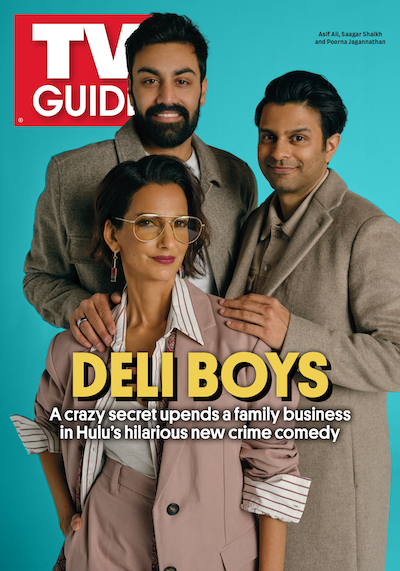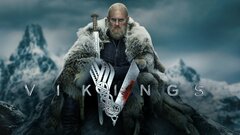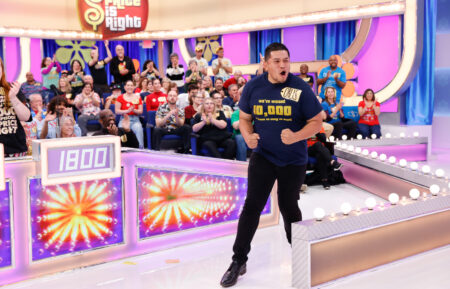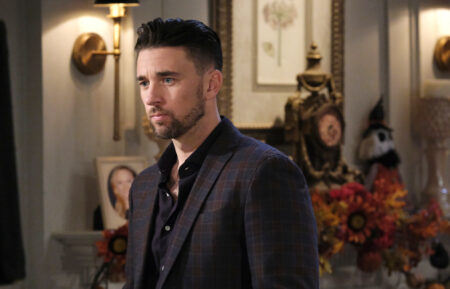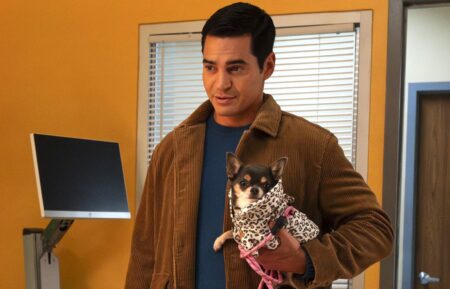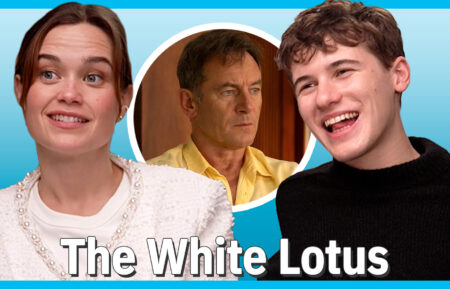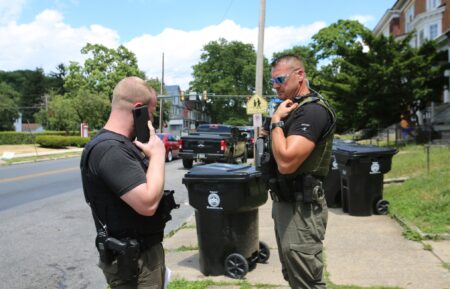Vikings Finale Postmortem: Gustaf Skarsgard Dishes on Floki’s Innermost Thoughts
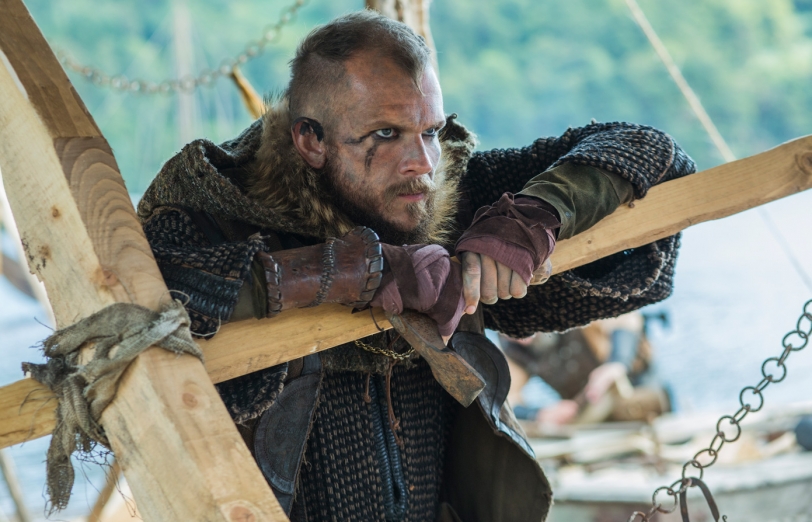
Floki’s secret is out. The twisted genius and pagan fundamentalist got a major shock in the Season 3 finale of Vikings when Norse king Ragnar (Travis Fimmel) rightly accused him of killing Christian monk Athelstan (George Blagden), who had replaced Floki (Gustaf Skarsgard) as Ragnar’s closest friend and most trusted advisor. We asked Skarsgard for the lowdown on his character’s journey this season, what it’s like working with Fimmel, and if Floki can survive now that Ragnar knows the truth.
Floki has always been on the edge of sanity, but in Season 3 he tipped into madness when he murdered Athelstan, didn’t he
I’ve read some reactions online that say, “Floki’s gone crazy,” but he hasn’t really changed, the circumstances have. He’s not a different man. People tend to forget the darkness of Floki that was already there in the first episodes of Season 1 where he threatened to kill the blacksmith’s daughter if he didn’t shut up about making the anchor for Floki, or the brutality and ruthlessness with which he has been killing Christians since day one. When he kills the one we love, Athelstan, all of a sudden we believe that he’s a bad person and that he’s changed drastically, but he’s been that [way] all along. It’s our perspective that’s changed.
But in Episode 8, as Floki realizes he is failing as commander of the Viking attack on Paris, he does say to himself, “You’re insane.”
He has become more and more radical. Floki’s a sick man in many was. He’s damaged goods. He’s bipolar. He’s probably psychotic. He’s on the verge of schizophrenia. I don’t know what you would call it. But he is crazy. He’s gone further in his insanity now. In Episodes 7 and 8, he’s pushed over that edge. Ragnar putting him in charge of the raid on Paris actually magnified Floki’s ego to the point where it pushed him over the edge to insanity.
The audience knows that Ragnar set Floki up for a fall when he put him in charge of that raid. Does Floki suspect that Ragnar knows he killed Athelstan?
He hasn’t shown it, but he’s definitely worried. When Ragnar summons Floki in Episode 7, Floki believes he’s going to get killed, but instead he gets a promotion (to lead the attack on the walls of Paris). He knows he can never know with Ragnar. Before, he’s always been on the “in” with Ragnar, but now all of a sudden he feels like Ragnar doesn’t trust him anymore. He doesn’t sit on all the information anymore.

A huge twist in this episode was that Ragnar faked a conversion to Christianity and his own death so he could use his coffin as a Trojan horse to get into Paris for a Christian funeral—and then attack the court. Like many others, Floki thought Ragnar was really dead, but when he said goodbye at his coffin he revealed too much, didn’t he
Totally. He gets a chance to say whatever he would say to Ragnar if he knew there would be no consequences. He’s definitely opening his heart up, for sure. He believes that his best friend has died. He feels so connected to him. Now that Ragnar has moved on, he feels split in half. I imagined what it would be like for Floki to lose his best friend at that critical point in their relationship where, in Floki’s view, Ragnar has betrayed him and the old gods. Losing him then…the idea of not being reunited with him in Valhalla, it’s devastating for him. And then there’s also a lot of emotion that Floki can never identify himself. There’s some sort of guilt because even though he believes he did the right thing killing Athelstan and even though he believes he did it for Ragnar, there is still an element of guilt for having hurt Ragnar like he did.
What was it like shooting that scene
We did quite a few takes and setups. It was the same setup with Lagertha (Katheryn Winnick) and Rollo (Clive Standen) in the same spot. We were all there the same day working on our scenes. It was a very intimate scene, a very intimate shoot. We could take our time. It wasn’t rushed or stressed. What’s so incredible about being on a TV show like this is that I know the character and the relationships so well so a lot of these emotions come to me naturally from wherever the story is taking me because I have done two years of preparation for this scene.
Floki tells himself he hated Athelstan for being a Christian and even blames the monk for the failed attack on Paris. But deep down, he was jealous of his friendship with Ragnar, right
Oh for sure. There’s definitely that element. That’s the underlying emotional element, or part of it. A lot of actions in this world and in previous worlds and previous times, people tend to justify their emotional life or actions through religion. That’s what Floki’s doing. He’s jealous that Athelstan comes in and what he believes is taking his place and becomes Ragnar’s closest man. Ragnar is everything that Floki’s ever had. He’s the only one who’s ever believed in Floki. So there’s definitely that jealousy there. But that’s nothing that Floki realizes himself. For him, he’s blindly convicted that he’s doing to save Ragnar, that he’s doing this for the sake of his gods. He’s blindly convicted.
Floki’s relationship with his wife, Helga (Maude Hirst), the only one who knows he killed Athelstan, has fallen apart. What has the loss of that closeness done to Floki
It’s very sad. He’s not doing great, really. And Helga, a sign of some kind of health or sanity from her side, finally has enough with this egocentric, crazy, genius, dangerous man. She’s had it, and he didn’t see that coming. He’s shocked. He’s taken her support for granted and that’s a good wakeup call for him—if he ever learns.
What’s Floki thinking in the final moment in the season finale when Ragnar beckons to him and says, “You killed Athelstan.”
There’s a lot. It’s one of those moments in which you have plenty of simultaneous thoughts. Okay, he’s lying here. Will he die? Will I get away with this? I could kill him now. He’s on the verge of dying anyway. He’s my friend, and I love him. Oh fuck, he’s finally found out. And so there’s definitely that side of it and the fear of the consequences and also the kind of like—this is something he doesn’t regret. This is something…He’s been waiting for this moment to arise where Ragnar was going to find out and question him. He has all his answers covered in a way. He knows he did this for what he believes was the best for Ragnar and for his gods. All those thoughts at the same time.
What’s your working process like with Travis
I love acting with Travis. He’s always alive, always present. That question you just asked, “What were you thinking in that moment?” Our thoughts are always more advanced than anything you could ever formulate. That is life. There is not just one thought you have. There are always 20 different thoughts. It’s the physical emotions most often. Then we can interpret that and verbalize that to ourselves but as we’re experiencing something we don’t really verbalize it. That’s what it’s like acting with Travis. We can just be present with each other and bounce off of each other, which is great.
As an actor, did you use any of those emotions you feel towards Travis in real life to help you access Floki’s grief
I don’t think I’ve ever been that close to a man who is not a family member as Floki is to Ragnar or Ragnar is to Floki. It’s not like I think about mine and Travis’s relationship. I know Floki so well and Ragnar so well. It’s strictly Floki and Ragnar. It has nothing to do with Travis and Gustaf. The emotions I have in that scene are Floki’s emotions. I don’t have to think about my dead cat or something or my relationship to Travis. It’s just how Floki would react.
What can you hint about Season 4?
I can hint to the fact that now since it’s out in the clear that Ragnar knows what has been done, this is a matter that has to be dealt with. Floki killing Athelstan is something that has to be dealt with.
From TV Guide Magazine
Crime, Comedy & Convenience Stores: Unwrapping Hulu's 'Deli Boys' With the Cast
Cupcakes, corndogs…and cocaine?! Two brothers find themselves in a hilarious pickle when they inherit an unseemly bodega biz in Hulu’s new comedy Deli Boys. Find out how The Sopranos and Real Housewives of Orange County influenced the cast. Read the story now on TV Insider.

